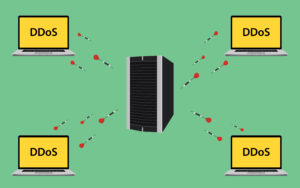Businesses face an increasing array of cybersecurity threats that can jeopardize sensitive information, disrupt operations, and damage reputations. Understanding these threats is crucial for developing robust defense strategies. In this article, we’ll explore the top 10 cybersecurity threats that every business, regardless of size, should be aware of.

Phishing Attacks:
Phishing attacks remain one of the most prevalent threats. Cybercriminals use deceptive emails or messages to trick employees into revealing sensitive information such as login credentials or financial details. Businesses should educate their staff on recognizing phishing attempts and implement robust email filtering solutions.

Ransomware:
Ransomware poses a severe risk, encrypting critical data and demanding a ransom for its release. Regular backups, employee training, and advanced endpoint protection are essential defenses against this growing threat.

Insider Threats:
Insider threats can be intentional or unintentional, involving employees, contractors, or business partners. Implementing strict access controls, monitoring user activities, and fostering a cybersecurity-aware culture can mitigate this risk.

Malware:
Malicious software (malware) includes viruses, worms, and trojans that can infect systems and compromise data. Employing robust antivirus solutions, regularly updating software, and conducting routine security audits are key preventive measures.

DDoS Attacks:
Distributed Denial of Service (DDoS) attacks overwhelm a business’s online services, rendering them unavailable. Implementing DDoS mitigation solutions and having a contingency plan in place can minimize the impact of such attacks.

Credential Attacks:
Credential attacks involve the theft or compromise of usernames and passwords. Multi-factor authentication (MFA), strong password policies, and regular password changes are crucial in preventing unauthorized access.

IoT Vulnerabilities:
The proliferation of Internet of Things (IoT) devices introduces new entry points for cyber threats. Securing IoT devices through regular updates, network segmentation, and proper configuration is essential for protecting business networks.

Supply Chain Attacks:
Cybercriminals often target the supply chain to gain access to a business’s network. Conducting thorough vendor risk assessments, ensuring third-party security compliance, and monitoring supply chain activities are vital safeguards.

Zero-Day Exploits:
Zero-day exploits target vulnerabilities in software that vendors are unaware of. Keeping software up to date, employing intrusion detection systems, and collaborating with security communities can help businesses stay ahead of potential zero-day threats.

Social Engineering:
Social engineering involves manipulating individuals to divulge confidential information. Educating employees on recognizing and reporting social engineering attempts is crucial in thwarting these sophisticated attacks.
Businesses must proactively address these cybersecurity threats to safeguard their assets and maintain the trust of clients and stakeholders. A comprehensive cybersecurity strategy, including employee training, advanced technologies, and proactive monitoring, is crucial in the ever-evolving landscape of digital threats. By staying informed and implementing robust security measures, businesses can fortify their defenses and navigate the complex terrain of cybersecurity risks successfully.

